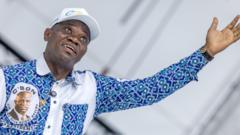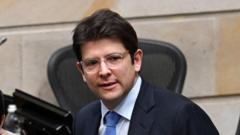With the upcoming presidential election, Gen Brice Oligui Nguema, the head of Gabon's transitional government following his coup in August 2023, is positioning himself as a populist leader, but skepticism abounds regarding the authenticity of the political transformation. Young voters cling to new opportunities amid unemployment, while the efficacy of Nguema's promises and the legacy of past regimes loom large.
Gabon on Edge: President Coup Leader Gears Up for Polls

Gabon on Edge: President Coup Leader Gears Up for Polls
As Gabon approaches a pivotal election, transitional leader Gen Brice Oligui Nguema, the mastermind behind a recent coup, emerges as the front-runner with promises to bring change.
In the heart of Libreville, Gabon's capital, a significant transformation is underway as citizens prepare for the presidential election. Gen Brice Oligui Nguema, the transitional leader who orchestrated the bloodless coup in August 2023, is now facing scrutiny as he aims to leverage his new authority to solidify his position. Supporting his claims for leadership are the letters of optimism among Gabon's youth, like Landry Obame-Mezui, who view his new directives as a means to personal advancement.
With Gabon's staggering youth unemployment rate reaching 40%, Oligui Nguema has introduced a hire purchase scheme providing more than 800 new taxis to empower aspiring young entrepreneurs. Obame-Mezui proudly displays his new "Taxi Gab+" as a testament to Oligui Nguema's promises for progress, openly declaring his intent to vote for the candidate who has pledged action over rhetoric.
The upcoming election represents a departure from over five decades dominated by the Bongo dynasty, and campaign posters of Oligui Nguema dominate every corner of the city, hinting at his sweeping visibility. Just weeks before the polls, many Gabonese express fatigue and disappointment, noting the sameness among candidates — most of whom were aligned with the previous regime. Shonnys Akoulatele, a disillusioned potential voter, expresses her lack of enthusiasm for candidates who seem unable to break away from historical patterns of governance.
Critically, Oligui Nguema, while positioning himself as a reformer—emphasizing social welfare and tackling corruption, even arresting members of the former Bongo family—carries the burden of his past associations. Emerging as the principal challenger is Alain Claude Bilie-by-Nze, a former ally of the Bongos, making it challenging for voters to grasp a genuine departure from past leadership.
Political analysts are concerned that true change will not come to Gabon without a substantial renewal of its political class. Many promise to use the election as an opportunity to dismantle the legacy of political corruption and abuses prevalent under previous administrations.
Despite barriers cited by critics, such as constitutional amendments favoring the transitional leader's candidacy, the upcoming election is still perceived by many as a critical opportunity to address grievances stemming from decades of Bongo rule. Gabonese citizens also this time find themselves voting without the traditional constraints of the well-entrenched political establishment, fueling hope for a new political landscape.
Through streets adorned with campaign slogans, Oligui Nguema's presence continues to loom large, symbolizing a potential pivotal moment for Gabon’s future, yet navigating the complexities of public sentiment amid a lingering skepticism about lasting reform.



















